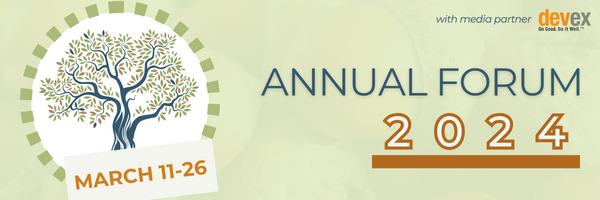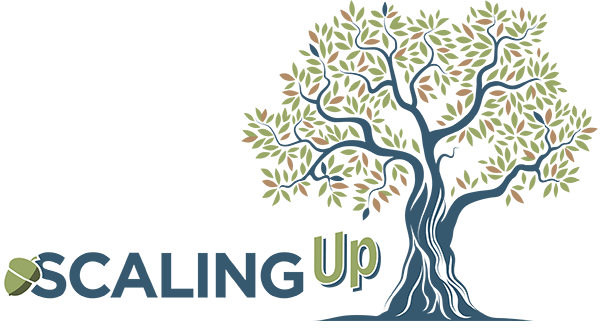
The 8th Annual Forum of the Global Community of Practice on Scaling Development Outcomes (CoP) will take place as a series of twelve 90-minute, virtual sessions spread over the two-and-a-half-week period from March 11th through March 26th.
The program of events includes 3 plenary sessions focusing on cross-cutting issues and a total of 9 sessions on sectoral and thematic perspectives on scaling organized by nine of the CoP’s sectoral and thematic Working Groups. Please see the schedule of sessions below. To see details of each session and register, please navigate to the right side of the page, click on the plus icon (+) for the session you are interested in, and select ‘register’.
|
Mainstreaming a Systematic Approach to Scaling to Funding Organizations.
This session will provide a first look at the interim findings and lessons from the CoP’s ongoing applied research effort exploring how funders are, and could, mainstream a systematic approach to scaling within their missions, operations, and priorities. Richard Kohl and Johannes Linn, who are leading the CoP’s applied research on this topic, will present the findings and lessons from 12 case studies the CoP undertook in 2023 and recently published detailing the mainstreaming journeys of 12 funder organizations – multilateral and bilateral donors, foundations, vertical funds, innovation and research funders, and INGOs. This presentation will be followed by discussion of the implications with a panel of experts and with participants. The takeaways from this plenary discussion will inform the research under the second phase of this initiative during 2024.
Book Launch: Scaling Up Development Impact
This session features Isabel Guerrero and her coauthors presenting and discussing with a global panel of experts the key messages from their recently published book, “Scaling Up Development Impact.” The book de-mystifies, frames and elucidates many of the scaling themes of greatest interest to practitioners, funders, scholars and the larger development community. It slices through important debates surrounding scaling, drawing on Isabel’s experience as Vice President at the World Bank, her experience supporting organizations to scale impact at Imago Global Grassroots, and her many years teaching a course on scaling at the Harvard Kennedy School. With a grounding in real organizational experiences, the book offers questions and tools to guide the scaling process, examining scaling from the purview of for-profits, governments, social enterprises, and funders.
Scaling Private Investment in Climate Adaption and Biodiversity
Why has it been so much more difficult to unlock private financing for climate change adaptation and biodiversity investments than for climate mitigation? And how is this picture changing? This session brings together practitioners in the fields of climate and nature investing – private companies investing in climate adaptation and biodiversity activities, financiers in capital markets, regulators and development banks – to highlight a range of practical approaches to scaling private investments in these areas. The discussion will focus on concrete opportunities and additional actions needed from the private sector, governments and the international community to further drive scaling in these areas.
Bridging Evidence to Policy Through Data for Scaling and Systems Change
Long-term partnerships of research and non-government actors working together with governments in the Global South have important and untapped potential for building state capacity while simultaneously scaling evidence-based interventions through the public sector. There are a growing number of models illustrating the power of these partnerships in different contexts to institutionalize use of data and evidence to support policy decisions of national significance. This panel will discuss how some of these approaches have been successful as well as challenges in implementing these partnerships for scaling as well as systems change within Governments.
Legislative Opportunities to Catalyze Social Enterprise Scaling
This session focuses on the role of government policy frameworks in enabling social enterprises to thrive and scale development impact. The talk will center on comparative legislative ecosystems in different countries and delve into the importance of creating a supportive regulatory environment for social enterprises. The session will include an exploration of existing, concrete legislative opportunities for advancing social enterprise.
Scaling Youth Employment in Response to Opportunities Created by the Energy Transition
Green jobs are already one of the world’s most rapidly growing occupations. The International Energy Agency projects that adopting clean energy technologies will generate millions of jobs by 2030, with millions more to retrofit and construct energy-efficient buildings and manufacture new energy vehicles. At the same time, the World Economic Forum’s 2023 future of jobs report cites the green transition as the key driver of job growth. However, most countries are not making the needed investments in training programs for the green jobs that will drive this growth. This session will explore the widening green skills gap with speakers from LinkedIn’s Economic Graph and FedEx and explore how education and training systems can be scaled up to respond to the economic megatrend.
Unlocking Potential – Agricultural Transformation and Scaling in Tanzania’s Southern Highlands
This session provides a close-up, inside look at what a deliberate effort to scale agricultural solutions looks like in practice. The Southern Agricultural Growth Corridor of Tanzania (SAGCOT) was established in 2010 to transform agriculture, boost incomes and improve nutrition in the Southern Highlands, then one of the poorest regions in Tanzania. SAGCOT works toward inclusive agricultural development by facilitating strategic public-private partnerships, crowding in investment, driving policy reform, and scaling technological innovations. This session explores SAGCOT’s evolution, achievements, constraints and lessons with a focus on implications for other countries facing the challenge of transforming agriculture systems to deliver locally-led productivity, income, and nutrition impacts at scale.
Scaling up of National Learning Assessments
Traditionally, education funding and metrics focused on expanding access. With the 2015 approval of the Sustainable Development Goal 4.1.1. on education quality, governments and donors belatedly acknowledged the need to pair measurement of expanded opportunity with cost effective and sustainable measurement of proficiency in reading and mathematics for children in primary and secondary school. This effort has been hampered by the fact that many of the available reading and math testing tools are too expensive for ministries of education to scale at a national level. This panel will discuss options for scaling sustainable and meaningful reading and mathematics assessments by national governments in low to middle income countries.
Political Economies of Scaling in Fragile Contexts
Despite institutional and regulatory weaknesses, systemic breakdowns, small private sectors andrecurring crises, a range of fragile contexts have surprised the development community by their ability to rapidly scale diverse development interventions—-from national safety nets and health programs to digitization initiatives and energy solutions. These efforts required sound technical and programmatic solutions, diverse partner networks, and sufficient resources to achieve scale. Yet, they also required scaling approaches that leveraged or were permissible within complex political economies— to garnerbroad-based support and expand and sustain inclusive results amid patterns of elite capture, clientelism and exclusion.
Join the Fragile States Working Group at the Scaling-Up Development Community of Practice Annual Meetings as we explore the political economies of scaling in various fragile contexts—to better understand the conditions, leverage points and workarounds that enabled scaling, and the challenges, implications, and opportunities for partners to work with or against the grain in supporting resilience and development in hard places.
Navigating Ethical Considerations When Supporting Scale Up of Health Interventions
Scaling any intervention requires changes to a system, process, behavior, or norm — and often a combination of these. As such, scaling initiatives have the potential to cause both great gain and significant harm. The session will explore the ethical implications of expanding implementation of health technologies and practices in such areas as digital and mobile health, family planning and maternal/child health programming, and the use of artificial intelligence. Concerns about who has – versus who should have – the opportunity to “set the agenda” will be discussed along with practical implications regarding how decisions are made about which innovations get scaled, which strategies are used, and who should benefit.
Scaling Nutrition Interventions: The Role of the Private Sector
This session will explore the opportunities and challenges posed by engaging the private sector in scaling nutrition interventions. A panel of experts will share their perspectives on three key aspects of this topic:
- How to mobilize private sector investment for nutrition
- How to support private sector businesses that provide nutrition services
- How to increase demand for nutritious food among consumers
The panel will also discuss the successes, lessons learned, and dilemmas that the nutrition community faces in working with the private sector. The session will invite the audience to reflect on the implications and recommendations for scaling nutrition interventions in different contexts.
Scaling 3.0, Future Directions for Scaling and for the Scaling Community of Practice
This plenary will consist of two segments: The first segment will summarize the main takeaways and implications of the preceding 11 sessions of this year’s Annual Forum. In the second segment, CoP Co-Chairs Larry Cooley and Johannes Linn will engage the audience in a discussion of emerging issues in scaling and future priorities for the Community of Practice.
Speakers:
Larry Cooley, Founder and President Emeritus, Management Systems International
Johannes Linn, Senior Fellow, The Brookings Institution


